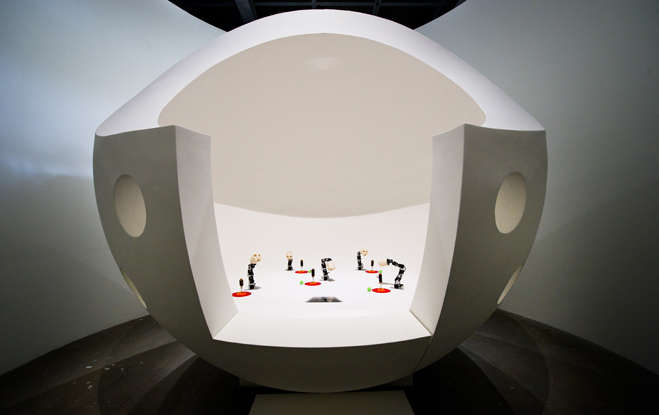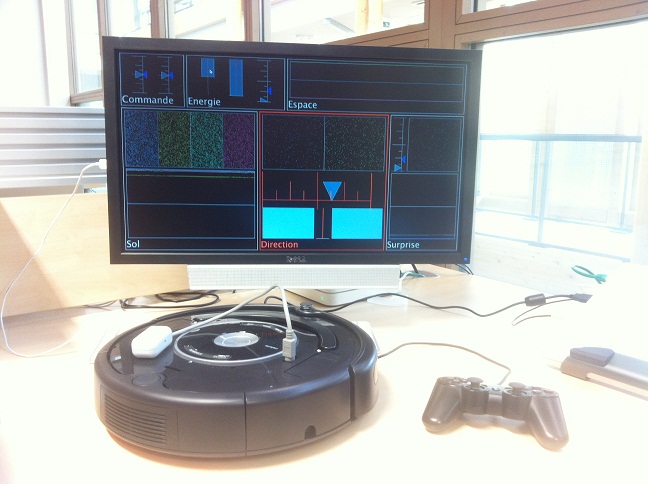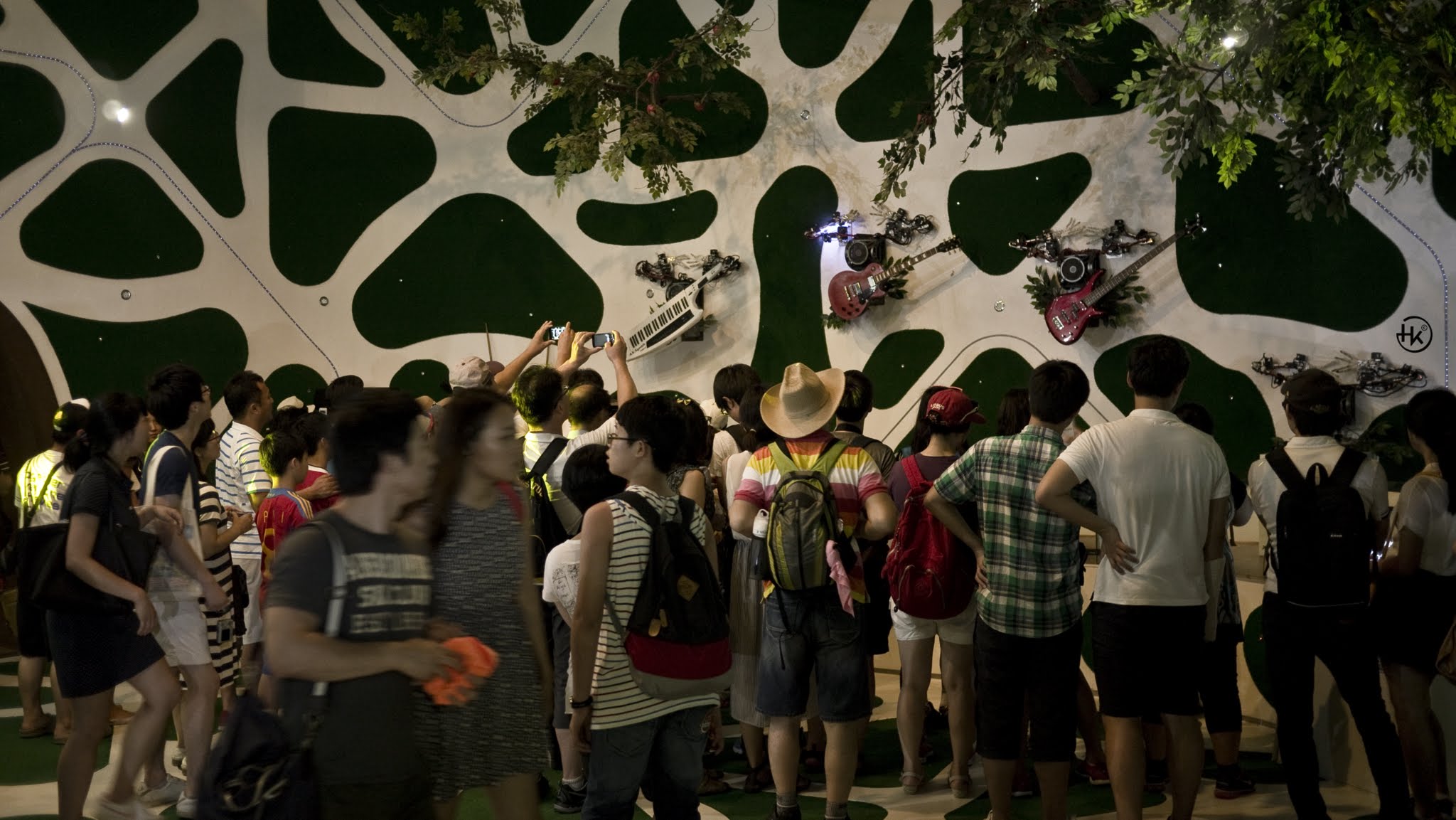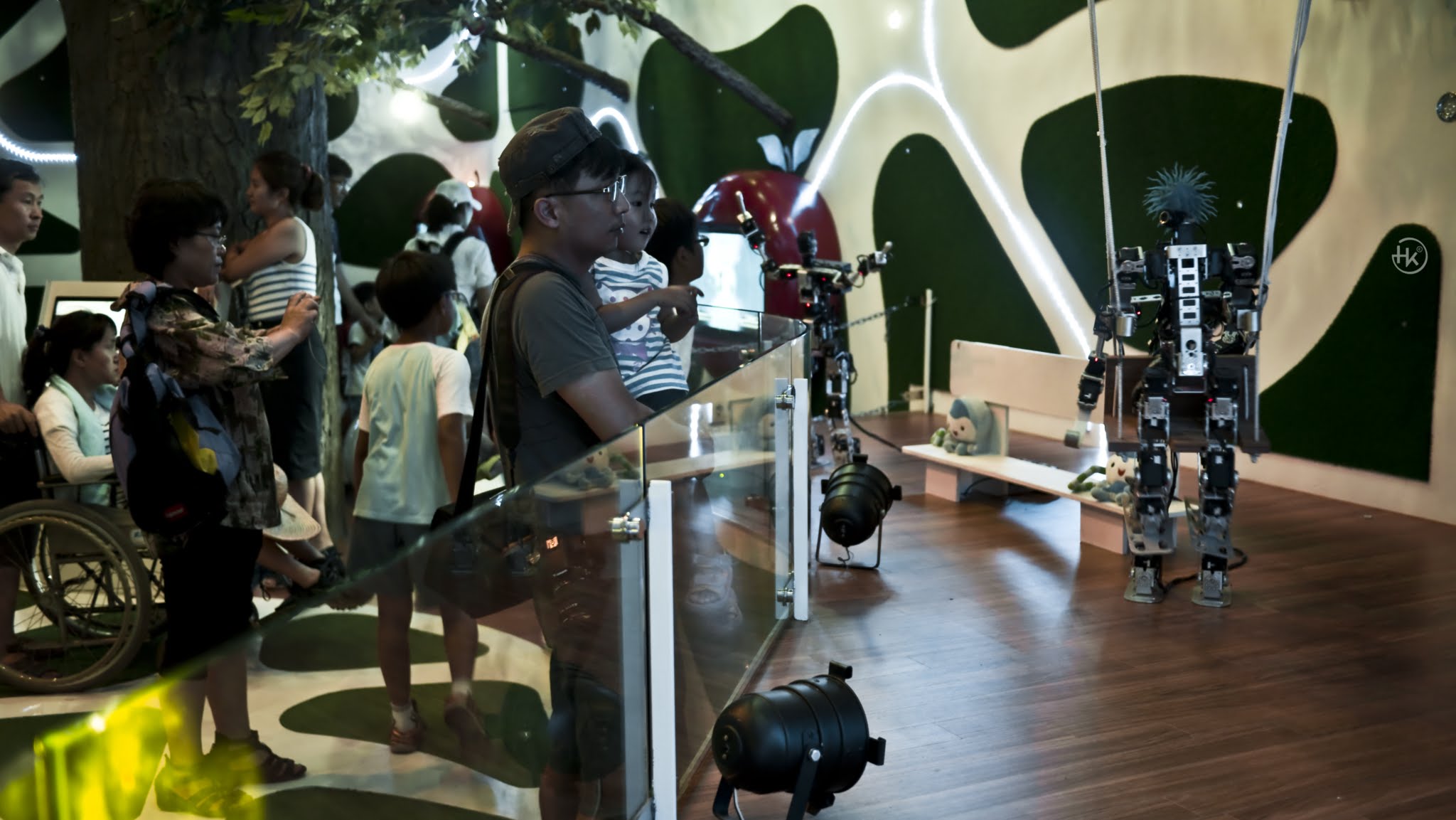Section: Dissemination
Popularization
Popular Science Articles
Filliat, D. (2012) Vers une cartographie sémantique d'environnements intérieurs. Réalités Industrielles, Février 2012.
Oudeyer, P-Y. (2012) GX-29 n'est pas un objet comme les autres, Sciences et Avenir Hors-Série, dec/jan 2011, "Qu'est-ce-que l'homme". http://flowers.inria.fr/documents/SciencesEtAvenirDec2011.pdf
Oudeyer, P-Y. (2012) Les Robots Curieux, DocSciences 14, Alan Turing: La pensée informatique. http://www.pyoudeyer.com/DocSciencesErgoRobots12.pdf .
Ly, O., Oudeyer, P-Y., Langlois, A. (2012) Le déséquilibre de l'apprentissage, Interstices. http://interstices.info/jcms/int_68096/le-desequilibre-de-lapprentissage
Popular Science Radio Broadcast
France Culture (2012), interview of P-Y. Oudeyer, La robotique pour mieux comprendre l'homme, (Interview, 45 mn), Emission « Continent Sciences » de Stéphane Deligeorges. http://www.franceculture.fr/emission-continent-sciences-pierre-yves-oudeyer-2012-01-16
France Info (2012), interview of P-Y. Oudeyer, Robotique et Sciences Cognitives (Interview, 5 minutes). http://www.pyoudeyer.com/FranceInfo19Jan2012.mpg
RCF Aquitaine (october 2012) interview of Fabien Benureau. It allowed us to communicate on PhD work on autonomous intrinsic motivation algorithms done at our lab.
Popular Science Videos
Ly, O., Oudeyer, P-Y., Langlois, A. (2012) Le déséquilibre de l'apprentissage, Inria (selected in category "hors-compétition" at Festival du Film de Chercheur à Nancy, to be used as support in schools). http://interstices.info/jcms/int_68096/le-desequilibre-de-lapprentissage
Langlois, A., Oudeyer, P-Y. (2012) Alan Turing et la robotique développementale (interview of Pierre-Yves Oudeyer), Vidéothèque Inria. http://www.pyoudeyer.com/turing_oudeyer_inria_2012.mp4
Popular Science Talks
(4th august 2012) "Un robot peut-il apprendre comme un enfant?", Marathon des Sciences, Festival d'astronomie de Fleurance, Fleurance, France. http://www.festival-astronomie.com/
(30th january 2012), P-Y. Oudeyer: “Les modèles robotiques: un nouveau langage pour comprendre le vivant”, Colloque "Mathématiques pour tous?", UNESCO, organisé par l'UNESCO en partenariat avec l'IHES et la Fondation Cartier pour l'Art Contemporain, UNESCO, Paris, France. http://www.science.gouv.fr/fr/agenda/bdd/res/4374/colloque-mathematiques-pour-tous-/
(14th december 2012), P-Y. Oudeyer, "Design et Auto-Design de Comportements et d'Interactions chez les Robots", Escales du Design, Bordeaux.
Museum exhibitions, science festivals and general public demonstrations
Ergo-Robots, exhibition “Mathematics, a Beautiful Elsewhere” at Fondation Cartier pour l'Art Contemporain
The FLOWERS team, in collaboration with University Bordeaux I/Labri, has participated as a central actor of the exhibition “Mathematics: A Beautiful Elsewhere” at Fondation Cartier pour l'Art Contemporain in Paris. This installation, called “Ergo-Robots/FLOWERS Fields” was made in collaboration with artist David Lynch and mathematician Mikhail Gromov (IHES, France), and shows computational models of curiosity-driven learning, human-robot interaction as well as self-organization of linguistic conventions. This exhibition, at the crossroads of science and art, allowed to disseminate our work towards the general public, explaining concepts related to learning mechanims in humans and robots to a large audience (80000 visitors). This was also an opportunity for experimenting and improving our technologies for life-long robot learning experimentation. For one of the first times in the world outside the laboratory, we demonstrated how it is possible to achieve experimentation with learning robots quasi-continously for 5 months. This opens novel stimulating scientific perspectives in the field of developmental robotics. This experimentation was presented through large audience radios, magazines and newspapers (France Inter, France Culture, RFI, Sciences et Avenir, Tangente, Financial Times, Daily Telegraph, Liberation, ...).
More information available at: http://flowers.inria.fr/ergo-robots.php and http://fondation.cartier.com/ .
|
Cap Sciences exhibition on “Brain and Cognition”
Cap Sciences is an organization in Bordeaux to promote and to communicate about science to the public. Cap Sciences is preparing an exhibit about the brain starting in February 2013. The Flowers team will contribute to this exposition by setting up a booth to explain the complexity of the processing required for intelligent artificial systems (e.g. robots) to transform observations from the environment to actions done in this environment, such processing being done continuously by all living beings, most notably by nervous systems and brains. To explain this idea, the Flowers team is working on a game for the visitors of the exhibit: a player has to drive forward a mobile robot, specifically an iRobot Roomba, while avoiding obstacles. The difficulty for the visitor in this game is that the player is not able to watch the robot in its environment: the player has to control it using only the sensory-information displayed on a computer screen (see figure 31 ). The player wins when the robot has traveled a given distance in a straight line and in limited time without bumping into an obstacle. This exhibit will start in February 2013 and last for a year. After that, it may move to different locations. More than 100,000 visitors are expected in Cap Sciences, half of them will come from elementary schools. The data generated by the robot and the visitors will be logged and will be available for research on life long learning with robots.
|
Robots at International Exposition held in Yeosu, South Korea
. In collaboration with Rhoban project/Labri/CNRS/Univ. Bordeaux I, the Flowers team participated to a project where several robots were elaborated and installed at the May 12, 2012 - August 12 2012 International Exposition held in Yeosu, South Korea (600k visitors). Exhibited robots were three humanoids (one dancing, two playing on a spring) and five musicians (arms only) playing musical instruments (electric guitar, electric bass guitar, keytar, drums, DJ turntables). Robots were installed inside the french ward, in a specific room named botanic garden. Humanoids were closed to the audience to allow interaction between people and robots (see Figure 33 ) while musicians robots were higher on a dedicated wall to increase visibility of the show (see Figure 32 ).
Science Festivals:
13 october 2012 : Lab visit and robot demonstration for the 'Fete de la science' in the robotics lab at ENSTA ParisTech, Palaiseau.
9, 10 et 11 Février 2012: Aquitec exhibiton. Acquitec is an opportunity for high-school students to discover jobs and formations directly from the schools and institutes that exhibit there. We presented few robotic platforms. (Fabien Benureau and Jonathan Grizou)
Press
Web links to the following press items are available on http://flowers.inria.fr/press.php .
TV
Universcience TV, jan. 2012: ”Art et maths”.
France 2, Tele-matin, jan. 2012: ”Les Maths: le 'probleme' des enfants”.
France TV/Culturebox, jan. 2012: ”Mathematiques: Un Depaysement Soudain” A la Fondation Cartier pour l'Art Contemporain.
Radio
France Info, 19 jan. 2012: ”Robotique et sciences cognitives” (3mn).
France Culture, jan. 2012, Entretien sur le sujet ”La robotique pour mieux comprendre l'homme” (45 mn), Emission Continent Sciences de Stephane Deligeorges. A propos du contexte scientifique dans lequel s'inscrit le projet Ergo-Robots.
Magazines
Jan 2012: Sciences et Avenir Hors-Serie, Numero Special ”Qu'est-ce-que l'homme”: ”GX-29 n'est pas un objet comme les autres”.
Newspapers
Sud-Ouest, march, 2012: ”Les Etonnants robots de la Fondation Cartier”.






